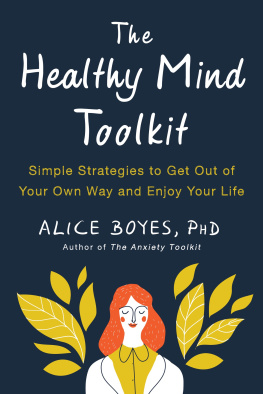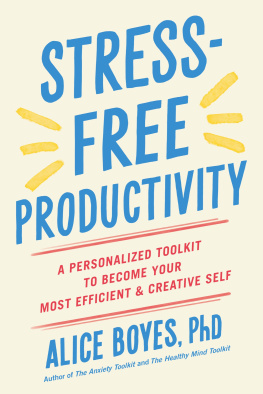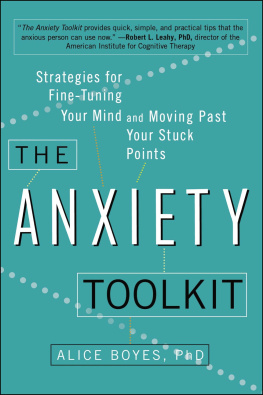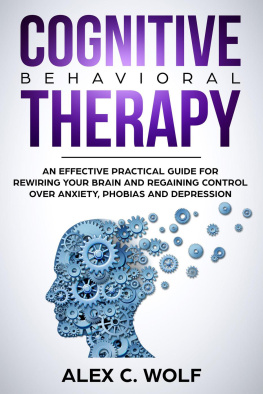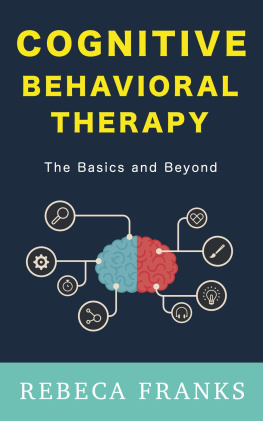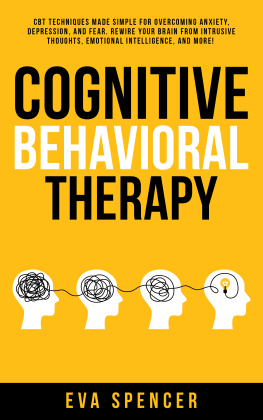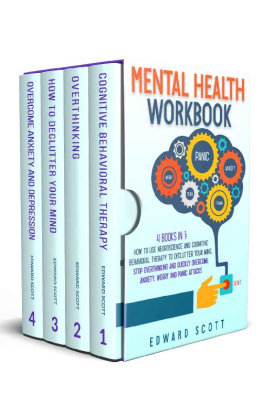
An imprint of Penguin Random House LLC
375 Hudson Street
New York, New York 10014
Copyright 2018 by Alice Boyes
Penguin supports copyright. Copyright fuels creativity, encourages diverse voices, promotes free speech, and creates a vibrant culture. Thank you for buying an authorized edition of this book and for complying with copyright laws by not reproducing, scanning, or distributing any part of it in any form without permission. You are supporting writers and allowing Penguin to continue to publish books for every reader.TarcherPerigee with tp colophon is a registered trademark of Penguin Random House LLC.
Library of Congress Cataloging-in-Publication Data
Names: Boyes, Alice, author.
Title: The healthy mind toolkit : simple strategies to get out of your own way and enjoy your life / Alice Boyes, PhD.
Description: New York : TarcherPerigee, [2018] | Includes bibliographical references and index.
Identifiers: LCCN 2017053507 (print) | LCCN 2017056018 (ebook) | ISBN 9781524704537 (E-book) | ISBN 9780143130703 (pbk.)
Subjects: LCSH: Self-defeating behavior. | Cognitive therapy. | Mental health.
Classification: LCC RC455.4.S43 (ebook) | LCC RC455.4.S43 B69 2018 (print) |
DDC 616.89/1425dc23
LC record available at https://lccn.loc.gov/2017053507
Neither the publisher nor the author is engaged in rendering professional advice or services to the individual reader. The ideas, procedures, and suggestions contained in this book are not intended as a substitute for consulting with your physician. All matters regarding your health require medical supervision. Neither the author nor the publisher shall be liable or responsible for any loss or damage allegedly arising from any information or suggestion in this book.
While the author has made every effort to provide accurate internet addresses and other contact information at the time of publication, neither the publisher nor the author assumes any responsibility for errors or for changes that occur after publication. Further, the publisher does not have any control over and does not assume any responsibility for author or third-party websites or their content.
Cover design: Jess Morphew
Cover image: Anna_Isaeva / iStock / Getty Images Plus
Version_1
To Celestethe best daughter a mother could hope for.
CONTENTS
PART 1
Understanding Self-Sabotage and Why We Do It
CHAPTER 1
How to Use This Book
Welcome
Have you ever experienced that feeling of exasperation when you realize youve created a problem for yourself? Maybe you stress yourself out over a request from your boss that turns out to be nothing, or you eat an entire family-size bag of popcorn because you didnt plan ahead while at the grocery store, or you turn down an opportunity because youre just not sure you can handle it. Whatever your situation, theres a common themeyoure getting in your own way.
In The Healthy Mind Toolkit, youll discover the ways in which youre holding yourself back and how to leave that behavior behind. Ill help you escape from self-defeating traps so you can enjoy a clear, calm mind and more productivity, freedom, and resilience.
Together, well identify where you go wrong with your decision making. Then Ill help you put together a personalized toolkit of the skills youll need for optimizing your thoughts and actions, which well tailor to your nature, lifestyle, and preferences. The result will be that youll feel more relaxed, youll sense your life is on the right track, and youll have enough mental energy to withstand everyday stress and take on meaningful personal challenges.
The book is divided into five sections: understanding yourself, foundation skills, correcting thinking errors, relationships psychology, and finally, work and money. In modern life, most of us dont have any spare time or willpower for implementing ideas that are excessively complicated and exhausting. You need easy, practical solutions, which is exactly what youll learn here. Well work on both knowing what to do to achieve more of what you want and how to do what you know, so that you can successfully implement your insights and the books tools.
Self-defeating behaviors are quite common, so youre certainly not alone in having this problem. And while each persons unique thought patterns and habits will be their own, theres a lot of overlap across people too. I can personally relate to many of the problem patterns well work through. In many cases, Ive found simple solutions that work for me consistently. Ive got strategies that prevent me from experiencing self-generated stress, or I can easily spot self-sabotage when Im doing it and correct it on the fly. For example, Im much better than I used to be at taking breaks, switching off my phone, prioritizing what I work on, seeing and implementing the simplest solutions to challenges, maintaining a balance between being cautious and carefree (preventing excessive worrying and ruminating), and not being penny wise but pound foolish.
In some cases, I find my self-sabotaging actions are harder to consistently prevent. I tend to react to change and surprises with anxiety-driven defensiveness. For example, a friend recently suggested she coordinate her vacation with my familys existing plans to visit a mutual friend of ours. My initial (internal) reaction was Accommodating three sets of babies nap schedules is going to be such a pain. However, I know myself well enough to spot this negative thinking as my typical first reaction to virtually any proposed change of plans. Sure enough, within a few minutes of thinking it over I realized the positives of all three of us getting together would far outweigh any minor scheduling and planning issues. My knee-jerk hesitation quickly shifted to feeling really excited about seeing both friends. Likewise, if someone makes an unexpected request of me, I often overestimate what the person is asking me to do. Its only later when Ive stepped back and gotten perspective that whatever has been asked of me seems achievable and not a big deal (or even positive). When it comes to handling trickier requests (for example, being asked to do something I dont want to do), an easy compromise or alternative solution frequently seems obvious once Ive had time to digest and process what has been asked. Although I have good insight into my patterns in this area, I dont always manage to hide my initial defensiveness at the time, and I sometimes need to go back and clean up, apologize, or correct my attitude after the fact.
Ideally, using what youll read here, youll discover strategies for preventing your self-sabotaging behaviors from occurring. Realistically, youll probably find yourself doing a mixture of prevention and treating the wound, as I do. Youll permanently solve some problem habits, but a few will remain works in progress. Ill help you learn how to respond constructively when these types of ongoing patterns occur, so you dont go spiraling into harsh self-criticism and rumination or blaming others unfairly. That way you can limit (or even reverse) any negative impact of your tendencies on yourself and your relationships.
Interestingly, many self-sabotaging patterns that look unrelated on the surface are actually two sides of the same coin. Here are some common examples. Can you relate to any of the following?

